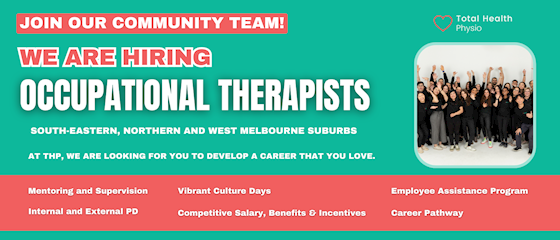
Browse the latest OTA updates, industry news and OT developments across Australia.
Victorian Election 2022
All Victorians should have access to occupational therapy services when and where they need them.
We are calling on candidates for the 2022 Victorian Election to address allied health workforce challenges as a priority to ensure all Victorians can access vital occupational therapy services regardless of their situation or location.
The health system is under pressure and allied health workforce challenges have been exacerbated by the COVID-19 pandemic, which is negatively impacting service delivery for our communities.
Investing in initiatives that enable a strong multidisciplinary allied health workforce is critical to ensuring Victorians have access to services that enable them to participate in the daily activities they need to live and thrive.
OTA wrote to the major parties contesting the Victorian State Election seeking information and undertakings on issues of concern to our members. Responses will be posted here as they are received to enable members to make an informed decision at the ballot box on 26 November.
We are calling on all parties and candidates to support the following priority areas this election –
-
1. Address critical allied health workforce shortages and increase access to occupational therapy services for consumers
The Issue:
According to data from the Australian Government Department of Health, occupational therapy is the fastest growing registered allied health profession, with the total workforce increasing by 7 per cent per annum between 2015 and 2019.[1]
Despite this, occupational therapists report significant difficulty attracting and retaining occupational therapists across public, private, academic and community settings. Whilst there are difficulties across all grades, shortages are most pronounced among senior clinicians, which has flow on effects to the provision of adequate supervision and support to early career therapists and in turn, the treatment of clients.
Workforce shortages and consistent vacancies are resulting in excessive workloads, burnout and high staff turnover. From a consumer perspective, waitlists for private occupational therapy services are lengthy and the public health system is under significant strain.
There are also significant constraints on the ability of the existing workforce to provide clinical placements for the growing cohort of occupational therapy students. This, in turn, impacts on the total number of student places that universities can offer, which has implications on the capacity of the profession to grow to meet increased demand.
The Solution:
Achieving a sustainable workforce relies on investment in attracting and developing the next generation of occupational therapists, as well as retaining existing clinicians.
We are calling on the next Victorian Government to invest in the attraction and retention of occupational therapists as part of a diverse, multidisciplinary public health workforce. This includes exploring innovative ways to incentivise and deliver clinical placements for the growing occupational therapy student cohort.
[1] Australian Government Department of Health. (2021). Allied health in Australia. Retrieved from https://www.health.gov.au/health-topics/allied-health/in-australia.
-
2. Enable access to occupational therapy-specific treatment, care, and support for Victorians with mental illness or psychological distress
The Issue:
Mental health is a longstanding and core area of practice in occupational therapy, dating back to the beginning of the profession. While occupational therapists utilise many of the same psychological therapies as other mental health professions, they are uniquely skilled in using ‘occupations’ to improve wellbeing.
Despite the value of multidisciplinary perspectives, general “mental health clinician” roles have proliferated in the Victorian public mental health system, especially at higher grades. These roles are not discipline-specific and can be filled by occupational therapists, psychologists, or social workers.
To achieve a diverse, multidisciplinary workforce, occupational therapists must be provided with opportunities to develop both specialist and generalist skillsets. Limiting prospects to general mental health roles reduces opportunities for discipline-specific career progression, support, and supervision, negatively impacting retention of senior staff. This can also impact the attraction of new graduate occupational therapists to careers in public mental health.
The Solution:
Achieving a diverse multidisciplinary mental health workforce relies on investment in those individual disciplines – discipline-specific support, training and development opportunities are critical to attracting and retaining clinicians and improving mental health outcomes.
We are calling on the next Victorian Government to commit to an increase in discipline-specific occupational therapy mental health roles in the public health system.
-
3. Improve access to allied health services, including occupational therapy, in rural and regional locations
The Issue:
The COVID-19 pandemic and subsequent lockdowns prompted significant migration from Melbourne to other parts of regional Victoria. The regional population has expanded and its needs have become more complex, placing further demand on regional workforces.
Occupational therapists advise that the structures for allied health in rural and regional areas are often lacking, with few senior positions, limited managerial roles and no director positions in many hospitals and health services. This may be due to cost constraints or the perception that such positions are not required due to the smaller size of these services compared to metropolitan equivalents.
In practice, advocacy and leadership functions are often being undertaken by grade 3 and 4 roles, despite this not being entirely within scope or adequately remunerated at this level. This reduces capacity of grade 3 and 4 allied health professionals to undertake clinical work or supervise students and inhibits innovation in models of care. It exposes staff to increased risk of burnout and complicates efforts to recruit and retain essential staff.
The Solution:
Senior and director roles are essential to develop and refine models of care, engage in strategic advocacy, support workforces, and ultimately enhance the working conditions that will attract and retain expertise to meet the needs of the growing regions.
We are calling on the next Victorian Government to invest in increased senior, managerial and director allied health roles in rural and regional hospitals and health services, to enable better services to be delivered in these communities.
-
4. Ensure sustainable access to occupational therapy services for Victorians recovering from injury or illness caused by motor vehicle accidents, or at work.
The Issue:
Occupational therapists play a vital role following motor vehicle and workplace accidents, assisting clients of all ages to rehabilitate and reengage in occupations. This includes paid and unpaid work or employment; social participation and leisure; and activities of daily living, such as showering, eating and dressing. As such, occupational therapists are key providers of compensable services with WorkSafe Victoria and the Transport Accident Commission (TAC).
Unfortunately, remuneration for this work is below that of other states and territories as well as the National Disability Insurance Scheme (NDIS). In addition to lower overall rates, the current fee schedules do not include many activities which, while non client facing, are essential to the delivery of care and are remunerated under the NDIS.
With high demand for services and increasing operating costs, occupational therapists report that it is becoming increasingly unviable to take on WorkSafe and TAC clients. Many senior clinicians who continue to service this complex cohort do so out of loyalty to longstanding clients. It is also increasingly difficult to attract new graduates given high demand and attractive starting salaries offered by many NDIS providers.
The Solution:
To attract and retain providers in the scheme, fee schedules must remain competitive with market rates and viable for business to offer services.
We are calling on the next Victorian Government to work with OTA, WorkSafe Victoria and the TAC to ensure sustainable access to occupational therapy services for Victorians recovering from injury or illness caused by road and workplace accidents.
Update 17 November: After asking the parties to strongly consider addressing the points above, OTA received detailed responses from the following parties:







.jpg)





